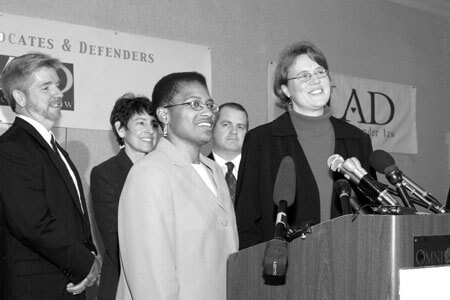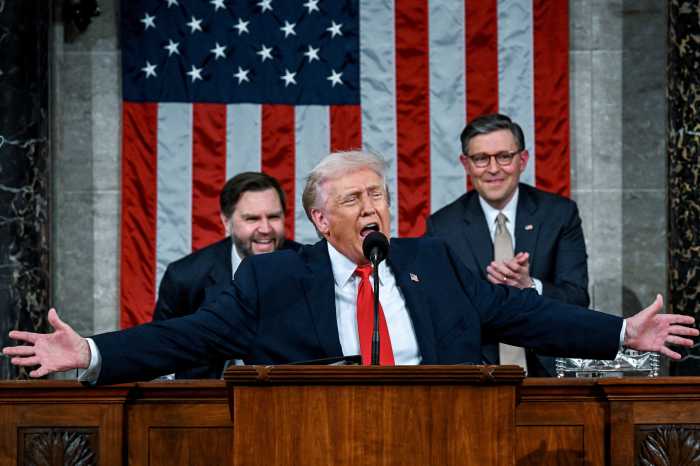Risks for both Bush and foes from shifts in “doctrines of liberty”
Legal advocates for the gay and lesbian community hailed the November 18 marriage ruling by the Massachusetts Supreme Judicial Court, confidently predicting same-sex marriage licenses will be issued in that state once the 180-day stay––granted to allow the legislature time to conform state law to the ruling––expires.
Spokespeople from the Gay and Lesbian Advocates and Defenders (GLAD), the Boston-based group that won the Massachusetts case, as well as from Lambda Legal Defense and Education Fund and Freedom To Marry uniformly described the ruling in superlatives, likening it to decisions by the courts of Ontario and British Columbia that have made sex-sex marriage a reality in those two Canadian provinces.
“This is a momentous legal and cultural milestone,” Mary L. Bonauto, the GLAD attorney who argued the marriage case before Massachusetts’ highest court, said in a written statement. “The law caught up with the reality that gay people and families are part of the fabric of our communities.”
Gary Buseck, also an attorney and GLAD’s executive director, discounted the possibility that the Massachusetts legislature, which includes many outspoken opponents of same-sex marriage, could derail the same-sex victory with a civil union alternative as was developed in Vermont after that state’s supreme court ruled in late 1999 that gay and lesbian couples there deserved all the rights and benefits afforded by marriage under state law.
“As we read the opinion, there is nothing that the legislature can do to stop, 180 days from now, civil marriage licenses from being issued to same-sex couples in Massachusetts,” Buseck said in a telephone interview.
Buseck said the 180-day state would allow the 351 cities and towns in the state “some breathing room” to conform their marriage license procedures to the new ruling.
“Civil marriage will happen in Massachusetts, no matter how the legislature responds,” said Evan Wolfson, executive director of Freedom to Marry, a New York-based group that provides strategic coordination to all of the nation’s legal and political groups fighting for same-sex marriage rights.
“This is a huge win,” Wolfson continued, “a momentous opportunity to make the points to our neighbors and to the nation that the Massachusetts high court made in its ruling––that there is no good reason for this exclusion, that it is a ‘scarring hardship,’ those are the court’s words, that harms real families, and that allowing gay and lesbian people to marry will harm no one while benefiting society.”
He said that the Massachusetts court’s discussion of “deep and powerful doctrines of liberty and equality” would provide an “immediately useful precedent” in other venues, perhaps most immediately in a Lambda lawsuit seeking same-sex marriage rights in New Jersey. That lawsuit was dismissed on summary judgment at the district level earlier this month, a not unanticipated outcome, but is being appealed to a higher court in New Jersey.
But Wolfson also warned that nearly twenty years elapsed from the time that the California Supreme Court made that state the first to strike down a ban on interracial marriage in the 1948 Perez ruling until the U.S. Supreme Court finally settled the matter in its 1967 Loving vs. Virginia case.
“Today ended sex discrimination in marriage.” Wolfson said. “It took nineteen years of progress and resistance following Perez, with a lot of work to do, but also a lot of hearts and minds that were changed. We have the opportunity to do the same.”
David Buckel, the lead counsel in Lambda’s New Jersey case, agreed with Wolfson’s assessment about the strength of the Massachusetts ruling and its value to his group’s lawsuit.
“The legislature has to take action within 180 days, or not,” he said. “The next step would be for the court to enforce the judgement.”
Though a ruling in one state does not create a formal precedent in another, Buckel, like Buseck, emphasized that gay rights rulings in the U.S. and elsewhere are increasingly making explicit reference to advances made in other jurisdictions.
“The Massachusetts court looked at fundamental rights and at equal protection,” Buckel noted. “Although a Massachusetts opinion is not binding on New Jersey’s high court, I have no doubt that the New Jersey justices will be reading the opinion with great care. There are lots of areas of common thinking on those courts on these issues.”
All three legal groups agreed that the only alternative left to anti-marriage forces in Massachusetts would be a state constitutional amendment, which could not get on the ballot until at least November 2006.
Barney Frank, the out gay Democratic U.S. representative from Massachusetts, appearing on ABC’s “Nightline” the night of the ruling to debate Kenneth Starr, the former special prosecutor who instigated the impeachment referral against Pres. Bill Clinton, said he was comfortable that a referendum more than two years after implementation of same-sex marriage in the state would allow voters to make “an informed choice.”
Two nights earlier, at a Manhattan fundraiser for Sen. John Kerry, the presidential hopeful from Massachusetts, Frank said he would not seek Kerry’s seat in 2006 if the senator were elected president because all of his attention would be focused on defeating the anti-marriage referendum.
Mitt Romney, the Republican governor of Massachusetts, called for a state constitutional amendment banning same-sex marriage immediately after the ruling was issued. Thomas Finneran, the Democratic House Speaker in Massachusetts whom the Boston Globe described as a social conservative, had vowed to back such an amendment if the court granted same-sex marriage, but was unavailable for comment after the ruling came down. The Senate Leader, Robert E. Travaglini, a Democrat who also stated his opposition to same-sex marriage prior to the ruling, commented that the court’s “decision is very clear,” according to the Globe.
On the national stage, leading Democratic presidential contenders scrambled to maintain the fiction of the status quo ante. Pres. George W. Bush, arriving in London for talks with British Prime Minister Tony Blair as the decision was announced, released a statement saying, “Marriage is a sacred institution between a man and a woman. Today’s decision of the Massachusetts Supreme Judicial Court violates this important principle. I will work with congressional leaders and others to do what is legally necessary to defend the sanctity of marriage.”
The president took the extraordinary step of criticizing a state court ruling, but as he did on July 30, Bush stopped short of endorsing the drive for a federal constitutional amendment limiting marriage to unions between one man and one woman. Some right wing groups have been pushing an amendment out of concern that if a state grants same-sex marriage rights, the federal Defense of Marriage Act (DOMA), enacted in 1996, might not withstand a constitutional challenge from a couple seeking recognition for their union from the federal government or from other states.
The constitutional amendment was introduced in the House of Representatives in the spring and has about 100 sponsors, many of them since the U.S. Supreme Court issued its ruling striking down sodomy laws on June 26. Just days after that ruling, Senate Majority Leader Bill Frist, the Tennessee Republican, said he supported the effort. Since then though, the drive has stalled somewhat, with even some conservatives raising questions as to whether it is appropriate to interfere with the rights of states to determine their own marriage policies.
It is not immediately clear how much impetus the Massachusetts ruling will add to the federal amendment drive. Dr. James Dobson, chair of the far right Focus on the Family, decried the ruling as an example of “the destructive power of the judicial tyranny that has gripped our nation,” raising questions in a written statement about whether DOMA, which has been replicated in 37 states, provides a sufficient bulwark against the perceived threat of same-sex marriage. Rev. Pat Robertson demanded a stronger response from Bush, saying the president must “finally recognize that our country will not be shackled to the issue of gay rights.”
The six leading Democrats seeking the presidency all issued statements the day of the ruling drawing on the same general formulation—support for equal rights for same-sex couples, and opposition to gay marriage, but also opposition to a federal marriage amendment.
Reggie Johnson, a spokesperson for former General Wesley Clark, said his candidate “supports extending all the benefits of marriage to all couples regardless of their sexual orientation,” but “believes that the name marriage is particular to couples of one man and one woman.” Joseph Lieberman, the Connecticut senator, said he is opposed to same-sex marriage, but believes that “states have the right to adopt for themselves laws that allow same-sex unions.”
Only Richard Gephardt, the U.S. representative from Missouri, said, “I hope the Massachusetts State Legislature will act in a manner that is consistent with today’s Massachusetts Supreme Judicial Court ruling,” even as he reiterated his opposition to gay marriage.
Among the Democrats, Dr. Howard Dean, the former Vermont governor, has staked out the most aggressive stance to date. Having signed Vermont’s civil union law in 2000, Dean, in a July 15 forum sponsored by the Human Rights Campaign in Washington, said that he would work to overturn DOMA as president and that he believed the federal government should recognize same-sex marriages sanctioned in Massachusetts or in Canada.
Sen. John Kerry, whose response to the ruling reiterated his opposition to gay marriage, even as he urged his home “state legislature to take action to ensure equal protection for gay couples,” perhaps finds himself in the trickiest political position. Should the debate in the Massachusetts legislature turn divisive, he may increasingly be called upon to speak more positively about the ruling from his state’s highest court.
Here in New York, the victory in Massachusetts was greeted enthusiastically, even as marriage advocates warned that this state was falling further behind. Jan Thompson, co-chair of Marriage Equality New York, called the ruling “a giant step forward for the same-sex marriage movement,” while noting, “We will have to trudge through lots of backlash.”
State Sen. Tom Duane, the Chelsea Democrat who, along with Manhattan Democratic Assmemblymember Dick Gottfried, is leading the effort for a same-sex marriage bill in Albany, noted that many of New York’s neighbors—Massachusetts, Vermont, Ontario, and, at least in terms of mounting a concerted legal effort, New Jersey—have made more progress than the Empire State.
“New York is going to have to follow suit,” Duane said. Neither he nor Gottfried, however, was available to speak to the specific state of their discussions with legislative leaders on their proposed measure. Connie Ress, a longtime marriage advocate who is an aide to Gottfried, said that Democratic Assembly Speaker Sheldon Silver “certainly would not want to see” a state DOMA enacted here in New York, but Eileen Larrabee, a Silver spokesperson, said that the speaker had brought neither the issue of opposing DOMA nor of supporting marriage before his conference of Assembly Democrats.
Joe Tarver, a spokesperson for the Empire State Pride Agenda, the leading gay rights political group in New York, said that his group has been meeting in recent months with both Lambda Legal and Marriage Equality New York, in an effort to “move forward on all fronts.”
“Everything is interconnected. We can’t just look to the legislature,” Tarver said. “We know that sooner or later that a case will be filed in New York State by a gay or lesbian couple who got married in Canada or in Massachusetts. We need to be ready for that and all three groups are exploring all possibilities and working with all of our allies across the state.”
“This is not a sprint, this is a marathon,” he added. “We are maybe at mile ten of 26 miles.”





































